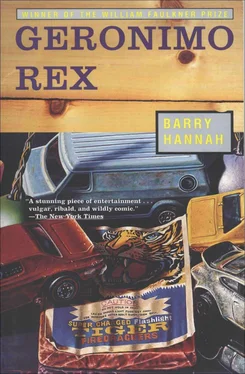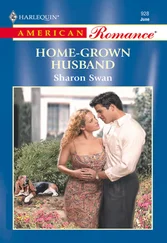She was put to earth one day in the nineteen teens. Her funeral took place just before her captain, husband, college president — who was so robed and hooded and encrusted with state, Southern, and even national honors in education he could barely raise his hand — bought the Old Chapel and its environs with funds from his denomination. His denomination loved him. He established a coeducational college here. But mainly, he now owned the Old Chapel. He taught in the room where his wife had had her moment with Grant. And perhaps, lecturing in Grant’s very footsteps, he saw the rising hem and the leg of the nineteen-year-old Lady Love revealed, time, time, time and again.
The name Hedermansever was given the college when it was saved financially in 1920 by the first of a long line of gloomy rich jingos by that name. No more was it Hannah College, though President Hannah still lived, and his denomination loved him.
Academically, he taught the Old and New Testaments.
He stood staunch against the short skirts of the coeds in the 1920s; and most of all, against automobiles. Surely he looked with horror upon the time when it would not matter a gnat to anybody which leg his wife had shown President Grant.
He saw students of his leave class and get in open cars with young women with bald knees and bangs, and he saw the automobile despoiling the family and community and church. He could imagine but one place for these couples to go in their automobiles, nowhere except to the peak of lust in some shade off the gravel road, with cigarettes, which he had also come out against after World War I. His denomination loved him.
And he was right. A farmer who could draw sent him a picture of a couple parked under some willows, on his land, he complained. The couple were mating in the car seat while cigarettes smoldered in their mouths. Hannah recognized the car, which was drawn unearthly well.
His age was eighty-six then. His heart was broken. He knew the young man who owned the car. He had taught him St. Paul on the afternoon in question. He recalled how beatific the young man had looked taking his notes. He recalled his dear wife, who gleamed with the treasure of the words he spoke to her — while these young gas-car people came alive only when he cleared his throat (or broke wind — the old deaf man never knew how loudly) or otherwise sounded like an automobile, pulling the lectern over or sliding the tin waste can with his foot.
He began raving. In his office he said, “They can send me fools to teach, and I will send them back educated fools; nobody can teach the fool out of them!” very many times the last week of his life. This statement bit and lasted. They had it cut into an epilogue on the marble tablet of the stone arch at the exit of the campus drive.
That dreary antique word fool lashed at me every time I drove under the arch. The tablet was muddy with veins now. Some days I was on my way to playing snooker over at the Twentieth Century Recreation in Jackson. Tuesday nights I was on my way to rehearsing with the symphony. Then there were the afternoons when I rode with a hag or roach: lonely, tacky girls I picked up in the coffee room or in the hall of the Fine Arts Building, girls wearing Ivy League outfits from Sears, Roebuck, girls with odd fannies, queer noses, and strange legs. Then one time, a positive beauty, begging to come with me and crash the Twentieth Century, where no women were ever seen, and then she opens her mouth to laugh and shuts it immediately, very sad now, looking out the window away from me, knowing I’ve seen them — her teeth, a brown nest of grubworms. “Take me back to the dorm,” she says. Then in front of the dorm she explains that her family had once lived in an Arkansas town where nobody knew the water was bad until their children got their permanent teeth. “It could have been something worse,” I said. Later I wanted to hang myself with shame. I wondered if I had begun some rotten subconscious habit last year with Tonnie Ray Reese. Why did I even approach these girls? Who was I to give them my backside when they didn’t suit my needs? How had I known there was some huge spoiling defect when I picked up this beauty with the teeth? I was sure I already knew, somehow, when my eyes took her in. Well, I was a fool, as the epilogue told me.
But the alternative to being a fool, and maybe a bastard, was staying on the campus of this forlorn asylum and being conscientious and being dead. Such choices, I think, have broken over this head of mine whenever I stopped to think.
I filled my space in the desks. I was looked through and talked through by all the Pee Aitch Dees, and I turned around to see just who they were looking at and talking to in the back of the room, and saw they were talking to nobody, but a thing: out there was the lawn, the olden greenery, the slow quietness, the recumbency, the ancient brick and the long, long history — everything you need for a cemetery.
We were dragged into Chapel three times a week to hear speakers of such interest as to make flies change place on a corpse. The Pee Aitch Dees checked roll for their sections and then sat down and slept the old eye-open snoozes of scholars. Up on stage would be a millionaire Christian from Texas, dramatizing life to us as a tennis game. There you were with the net of dread in front of you; but you had to keep serving; you fended, you sweated, you looked to see if your partner was still there and He was. It was Jesus. (The Savior favored a dogwood racquet with lambgut strings — a cheap joke on my part, but it matches the allegory of the millionaire evangelist.) Another morning we heard the anti-beer and anti-promiscuity specialist, a limp bachelor of fifty who was a huge personality among the denomination. He clung meekly to the lectern, paralyzed us for five minutes with memorabilia about vivid prudes we had never known, then he affected a madness like Hamlet’s and cannonballed — dry limp hands flying, wide stiff suit reminiscent of an iron lung — into a case history of two “young people” on a Saturday night. Hands wrapped together now, coming to it with dire breathlessness, holding the vowels in his mouth: “A dark night, a parked car, a can of beer, a fond embrace … a wandering hand … and sin entered the lives of these young people!” Oh, the dizzy sick mauling of it; oh, the vague sweaty pre-coital commotion; oh, the breaths of beer, that drink “akin to rat urine!” (so he pronounced it) — all we students perking up when he said that. Then he told us about seeing the rat swimming in the beer of the vat of a brewery down in New Orleans. The student body and I sat back then. We had thought we were going to hear about the whole act of love, but no, and we lay back in the seats. The boy right behind me was a famed athlete on the Hedermansever football team. They called him Mole-Digger. Mole-Digger struck me on the back of my head. I turned around. He leaned up on the back of my seat and whispered, “Why’ont you raise yo hand and ask him would he go on about them lovers …” Another athlete, sitting next to Mole-Digger, had a big, living snake in his hands. Covertly, he rammed the writhing thing under the back of Mole-Digger’s tee shirt. So Mole-Digger fell back, clutching his back, grinning, and that was my only contact with Mole-Digger, forever.
But the ministerial students, who were about thirty per cent of the student body, stood up and clapped for the bachelor at the podium who was such a great name among their denomination. In their ranks were the hard-lipped scowlers for Jesus and the radiant happy gladhanders for Jesus. You had Jesus coming at you in all styles at Hedermansever. You had people full of Jesus who dressed very costly in Ivy League and you had people full of Jesus who looked like they just ran out of a fire.
Читать дальше












